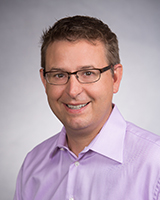David R. C. Natale, PhD

Assistant Professor
Department of Reproductive Medicine
University of California, San Diego
2A03 Leichtag Biomedical Research Building
9500 Gilman Drive, MC 0674
La Jolla, CA 92093-0674
p. 858.822.0758
f. 858.534.1438
e. natale@ucsd.edu
http://repro.ucsd.edu/Natale/SitePages/lab-home.aspx
Interview:
Q. Tell us a bit about your graduate research. What were your most exciting findings?
I started working with Dr. Andy Watson in Physiology in the summer of 1997. In September of that year, I officially started as an MSc student in Andy’s lab, using differential display RT-PCR to study changes in gene expression across preimplantation development in bovine embryos. After identifying some differentially expressed genes in cow embryos, we switched to the mouse model to confirm our findings and to facilitate further investigation in a model with greater access to reagents. I went on to identify and investigate a role for p38 MAPK signaling in controlling embryo compaction and trophectoderm differentiation in mouse embryos.
Q. When did you realize that you would most likely pursue a career in academia?
When I decided that I was going to proceed with my PhD rather than completing a MSc, I knew that I was committed to pursue a career in academia.
Q. What skills did you acquire in graduate school that help you in your current position? How did your degree give you an advantage in attaining your position?
During graduate school, I learned to “think outside the box”. I learned to look at problems from several different perspectives. In addition, I learned that in order to solve a problem in science, it is important to be open to trying new techniques and approaches and to be comfortable in venturing outside of what you know. Try something new!
My PhD in Phys/Pharm provided me with excellent exposure to several different research areas in physiology and reproduction. I feel like this varied background was an advantage in finding a post-doctoral fellowship and ultimately, a faculty position.
Q. How did you learn about the posting for your current job?
I learned about the position that I am currently in through a colleague at a meeting.
Q. What are some suggestions for networking?
I think that the most important opportunities to network are at scientific meetings and courses. As a student, I think that you should take absolutely EVERY opportunity to go to meetings and workshops. When you’re there, talk to people. Talk to other students, post-docs, technicians and PI’s if the opportunity arises.
Q. What is one piece of advice you can offer to current graduate students? To current post-doctoral fellows?
To current graduate students, I would suggest that you meet and talk to as many people as you can during your degree. Keep your options open and let your interests and passion guide your research. Ultimately, this will help you to find an area that you are passionate about.
For post-doctoral fellows, think about where you see yourself in 5 years. What area of research do you want to be working in? What are the interesting questions in that area? Once you have identified these things, consider what kind of research experience would help you to get to where you want to be in 5 years and then start looking for a lab/supervisor that will help you to get there. Don’t be afraid to go outside your comfort zone as a different experience will help to provide perspective and develop different approaches to research problems.
Q. What is your favourite part of your job?
My favourite part of my job is looking at primary data – qPCR results, cell morphology, tissue sections and in situ hybridization results! I love to see what new and exciting results are coming out of our experiments!
Q. What does your perfect Sunday look like?
Family time. A work-life balance is important. Plan your work so that you have time to enjoy the people and other things in your life!








